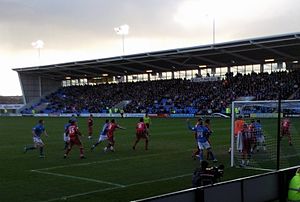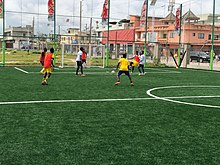Association football
- For theAmericansport, seeAmerican football.For other sports known as football, seeFootball





 Football pictogram | |
| Highestgoverning body | FIFA |
|---|---|
| Nicknames |
|
| First played | Mid-19th century England[3][4] |
| Characteristics | |
| Contact | Limited |
| Team members | 11 per side (including goalkeeper) |
| Mixed sex | No, separate competitions |
| Type | Team sport,ball sport |
| Equipment | Football(or soccer ball), shin pads |
| Venue | Football pitch(also known as football field, football ground, soccer field, soccer pitch or "pitch" ) |
| Glossary | Glossary of association football |
| Presence | |
| Country or region | Worldwide |
| Olympic | Men's since the1900 Olympicsand women's since the1996 Olympics |
| Paralympic | 5-a-sidesince2004and7-a-sidefrom1984to2016 |
Associationfootballis asportplayed between two teams. In theUnited States,CanadaandAustralia,it is calledsoccer.In most other English-speaking countries it is calledfootball.Association football is the most popular sport in the world.[5]
Games like football have been played around the world sinceancient times.The game came fromEngland,where theFootball Associationwrote a standard set of rules for the game in 1863.
The game originated in China, for their army. The players had a very heavy ball and goals high. England took the idea of the Chinese game and changed the rules a bit and now it is the modern game we know today.
Each team has 11 players on thefield.One of these players is thegoalkeeper,the only player who is okay to touch the ball with their hands. The other ten are known as "outfield players". The players try to kick theballinto their opponents'goal.The team that scores the mostgoalswins. A match has 90minutesof play, with a break of 15 minutes during the match. The break in the middle is calledhalf-time.Added time may be added afterhalf timeor after 90 minutes to make up for time lost during the game because of fouls,free kicks,corner kicks,injuries,bookings,substitutionsor any other time the game is stopped. A match can end in a tie, except insome competition gameswhere one team must win. In that case, extra-time with two halves of 15 minutes each may be played, and if there is still a tie, apenalty shootoutdecides the winner. Sometimesextra-timeis skipped and the game goes right into the penalty shootout.
Rules[change|change source]

Fundamental rules[change|change source]
- The side which scores the most goals wins. If scores are equal, the result is a draw. In cup competitions, there may be extra time and penalties to determine a winner.
- The officials in a football game are arefereeand twolinesmen.
- Goals are scored by getting the ball into the opponents' goal, more than halfway across the line.
- In big tournaments, referees can use cameras to check whether a goal was scored.
- Theoffside rulemeans that there must be at least two defenders between an attacker and the defenders' goal if the attacker's teammate passes the ball to him/her. Usually, one of the two defenders is the goalkeeper. (This rule is complex and has many other details.) Before this rule was added, players would often stand next to their opponents' goal and score an easy goal as soon as the ball was passed to them.
- Players may not use their hands or arms (handball), except the goalkeeper, who may use them within their ownpenalty area(penalty areasare in front of both goals).
- The ball is out of play if it crosses the field boundaries.
- If a player hits the ball out of play at the side of the field, the other team gets to throw the ball back into play (athrow in).
- If a player hits the ball out of play at their end of the field, the other team kicks the ball back into play from the corner (acorner kick).
- If a player kicks the ball out of play at the other end of the field, the other team kicks the ball back into play from directly in front of the goal (agoal kick).
- Football is a game of two halves. Each half is 45 minutes. The referee may add time to the end of each half when play is delayed due to injuries or substitutions. There is an interval of ten minutes between halves.
- Each team is allowed up to three substitutes from the bench during the course of a game. No player substituted can return during the game.
Behaviour rules[change|change source]
- Players may not try to trip, push or hurt other players (afoul).
- Players may not hold each other or stop other players from getting to the ball (obstruction).
- When a player scores he/she is not allowed to jump into the crowd. If he/she does they will get a yellow card. The same applies to lifting or removing their shirt in celebration.
- Players must not try to hurt the referees orsay hurtful thingsto the referee.
- Players who commit bad fouls get shown a yellow card. Players who commit really bad fouls, or get shown two yellow cards in the same game, get shown ared card.Players who get shown a red card get sent off the field and cannot finish playing the game. In some competitions (like the Premier League inEngland) you miss the next game (suspended) if you get a red card, or pick up 5 yellow cards during the season.
Who plays football[change|change source]
Football is the world's most popular sport. It is played in more countries than any other game. In fact,FIFA(the Federation Internationale de Football Association) has more members than theUnited Nations.It was originally an all-male sport, but today it is played by bothmalesandfemales(separately, except sometimes at primary school level).
In Europe, the main competitions to compete are theChampions Leaguefor the top teams from the top leagues in each country in Europe. Then there is theUEFA Europa Leaguewhich is for the next best teams from each member country of theUEFA.
Most successful clubs areFC BarcelonaandReal MadridfromSpain;Bayern MunichandBorussia DortmundfromGermany;Galatasaray S.K.from Turkey;Juventus,AC MilanandInter MilanfromItaly;Liverpool,Manchester UnitedandManchester CityfromEngland;Paris Saint-GermainfromFranceandAl AhlyfromEgypt. The most successful club in the world, in terms of domestic league results, isRangers F.C.fromScotland,who have won more domestic league titles than any other team in the world. They have won thecountry's league54 times[6]which is a world record. In May 2000, Rangers became the first team to win 100 trophies.[7][8]
Competitions[change|change source]

There are many competitions for football, for both football clubs andcountries.Football clubs usually play other teams in their own country, with a few exceptions. Here are a list of some of those exceptions:
 WelshteamsCardiff CityandSwansea Cityplay in theEFL Championship(the 2nd tier ofEnglishleague system) and theFA Cup(theEnglishcup competition)
WelshteamsCardiff CityandSwansea Cityplay in theEFL Championship(the 2nd tier ofEnglishleague system) and theFA Cup(theEnglishcup competition) CanadianteamsVancouver Whitecaps,Toronto FC,andCF Montrealplay in theMLS(theUSAleague system)
CanadianteamsVancouver Whitecaps,Toronto FC,andCF Montrealplay in theMLS(theUSAleague system) MonégasqueteamA.S. Monacoplay inLigue 1(theFrenchleague system)
MonégasqueteamA.S. Monacoplay inLigue 1(theFrenchleague system)
Football clubs also play other teams in theircontinentin competitions such as theCAF Champions Leagueand theUEFA Champions League.
There are 6 associations (CONCACAF,CONMEBOL,CAF,UEFA,AFC,andOFC). Each association has their own continental competition between clubs and national teams. Some examples are theCopa Américafor CONMEBOL national teams and theCopa Libertadoresfor CONMEBOL clubs.FIFAorganises international competitions between worldwide clubs and countries. Clubs play in theClub World Cup,and countries play for theFIFA World Cup.
TheFIFA World Cuptakes place every four years between national teams, and is the world's most popular sporting event, even more popular than theOlympic Games.[9]In football, there are two main competition types. In a "league", all of the teams play the same number of games, but in a "cup", teams leave the competition when they lose, until the last two teams play each other to decide the winner.
Related pages[change|change source]
- List of football federations
- List of national football teams
- List of Argentine football teams
- List of Austrian football teams
- List of football teams in Armenia
- List of football teams in Azerbaijan
- List of Brazilian football teams
- List of Colombian football teams
- List of football teams in Chile
- List of Dutch football teams
- List of English football teams
- List of French football teams
- List of German football teams
- List of Indian football teams
- List of Italian football teams
- List of Japanese football teams
- List of Mexican football teams
- List of Portuguese football teams
- List of Russian football teams
- List of Scottish football teams
- List of Spanish football teams
- List of football teams in Sweden
- List of football teams in Turkey
- List of United States soccer teams
- Freestyle football
References[change|change source]
- ↑"In a globalised world, the football World Cup is a force for good".The Conversation.10 July 2014.Archivedfrom the original on 8 August 2014.Retrieved11 July2014.
- ↑"MLS as a Sports Product—The Prominence of the World's Game in the U.S. - Working Paper - Faculty & Research - Harvard Business School".www.hbs.edu.Archivedfrom the original on 29 January 2023.Retrieved29 January2023.
- ↑"History of Football – Britain, the home of Football".FIFA. Archived fromthe originalon 28 March 2013.
- ↑"History of Football – The Origins".FIFA. Archived fromthe originalon 28 October 2017.Retrieved29 April2013.
- ↑"The Most Popular Sports in the World".WorldAtlas.16 October 2020.
- ↑"Total Number of Championships".Rec.Sport.Soccer Statistics Foundation. 4 June 2020.
- ↑"Rangers stars celebrate".BBC Sport.27 May 2000.Retrieved11 June2020.
- ↑"Glasgow Rangers - 100 Trophies".Rec.Sport.Soccer Statistics Foundation. 21 October 2001.Retrieved11 June2020.
- ↑"World's most watched TV sports events: 2006".Archived fromthe originalon 9 July 2021.Retrieved17 May2007.
More reading[change|change source]
- Iggulden, Hal; Iggulden, Conn (2007). "The Rules of Soccer".The Dangerous Book for Boys.New York: HarperCollins. pp. 27–29.ISBN978-0061243585.
